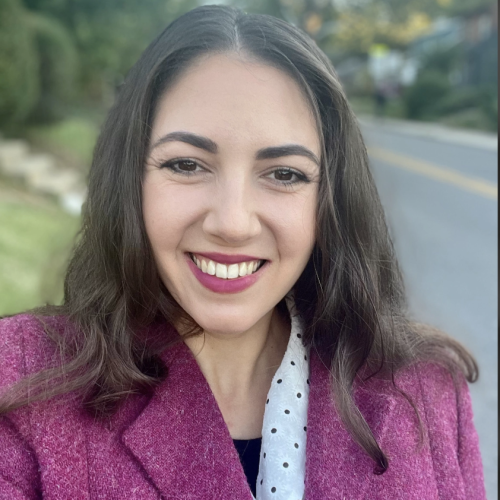MA
Philosophy
Tufts University
2016

Dr. Pearlman works in normative epistemology, with an emphasis on feminist philosophy and philosophy of race. She received her Phd in Philosophy from Indiana University – Bloomington, where she also earned a certificate in college pedagogy. Most of her research centers on our interpersonal obligations to one another, especially under unjust social conditions. In her dissertation, she argued that non-group members have both an epistemic and moral duty to defer to marginalized testifiers when they testify about the identity-based harms that they have experienced. Dr. Pearlman also holds secondary interests in the philosophy of philanthropy and applied ethics. In addition to her philosophical interests, she also has published work on college teaching, with a focus on curricular design and inclusive pedagogy.
Philosophy
Tufts University
2016
Philosophy
Indiana University
2023
Effective Altruism is a popular social movement that encourages individuals to donate to organizations that effectively address humanity's most severe poverty. However, because Effective Altruists are committed to doing the most good in the most effective ways, they often argue that it is wrong to help those nearest to you. In this article, I target a major subset of Effective Altruists who consider it a moral obligation to do the most good possible. Call these Obligation-Oriented Effective Altruists (OOEAs), and their movement Obligation-Oriented Effective Altruism (OOEA). I argue that, insofar as this variety of OOEA seems to commit us to refrain from helping the people right in front of us, there is something intuitively wrong about it. In response, I introduce an alternative model that embraces partiality: Mutual Aid. Mutual Aid is a network of community members, usually from the same geographical region, who share a commitment to offer, receive, and exchange material goods, wealth, and social support. I recommend Mutual Aid as a liberatory model, which—through empathy, solidarity, and care—mobilizes community-building and provides a catalyst for community advocacy. As such, we should resist the claims of OOEAs that partially distributing our funds to people or causes we care about is morally wrong or even less than ideal. We do not have a moral obligation to use our funds "effectively"; rather, we have a broader obligation to address human suffering, and Mutual Aid is one moral alternative for discharging this duty.
In this paper we argue that moral deference is prima facie obligatory in cases in which the testifier is a member of a marginalized social group that the receiver is not and testifies about their marginalized experience. We distinguish between two types of deference: epistemic deference, which refers to believing p in virtue of trusting the testifier, and actional deference, which involves acting appropriately in response to the testimony given. The prima facie duty we propose applies to both epistemic and actional deference, though defeaters may quash either or both obligations. Even if one fails to epistemically defer to the marginalized testifier, we argue that they may still be ethically obligated to act in accordance with their testimony.
J.L. Austin argues that ordinary language should be used to identify when it is appropriate or inappropriate to make, accept, or reject knowledge claims. I criticize Austin’s account: In our ordinary life, we often accept justifications rooted in racism, sexism, ableism, and classism as reasons to dismiss knowledge claims or challenges, despite the fact such reasons are not good reasons. Austin’s Ordinary Language Epistemology (OLE) classifies the discounting of knowledge claims in classic cases of epistemic injustice as legitimate ordinary maneuvers. I provide recommendations for revision of OLE and offer a means of distinguishing between dismissals in cases of epistemic injustice and their legitimate counterparts.
The philosophical literature on solidarity is, unsurprisingly, set on answering two conceptual questions. First, what does solidarity consist of? And second, what does being in solidarity require?
While it is largely agreed upon that solidarity is a kind of unity among persons, this agreement is short-lived – for if solidarity involves unity, what kind of unity is this? That is, does solidarity coalesce around shared identity or simply fellow-feeling? Shared action or fate? Or is solidarity merely a matter of commitment to a particular cause to achieve certain ends? Below, I look to examples of Mutual Aid to reject a piece-meal model of solidarity (where solidarity is this but not that) in favor of a more pluralistic account. The notion of solidarity need not be constrained, all or nothing, by a specific strain of interpretation. Instead, we should recognize that solidarity is a matter of variety and degree.
Despite increasing evidence that the traditional lecture is inefficient for student learning, such methods remain the central paradigm for teaching logic. In this paper, I identify the deficits of the lecture model and outline the many benefits of flipping the logic classroom—namely that students can absorb information at their own pace, freeing classroom time for active learning activities, and allowing the students to come prepared to actively engage in deeper levels of learning. I provide advice for curricular change from the traditional model, and guidance for flipped classroom implementation. I also offer suggestions for the best use of newly available class time, and advice for keeping students accountable for learning the information prior to class. Last, I consider common challenges with the flipped classroom model. I acknowledge possible obstacles to flipping the undergraduate logic course and address these challenges with potential solutions.